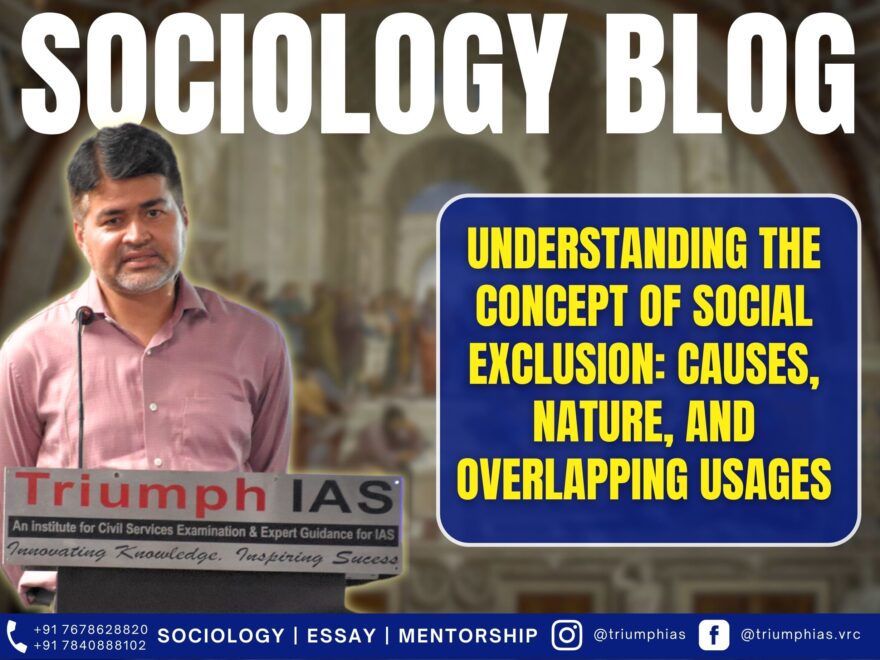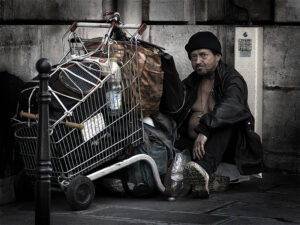Concept of Social Exclusion
Relevant for Sociology Paper-1 (Unit-5)

Social exclusion is a phenomenon in which individuals or households face deprivation, either in terms of resources like income or in terms of social connections to the broader community or society. It encompasses the various ways in which individuals can become disconnected from complete participation in the wider community.
To lead a fulfilling and engaged life, individuals need more than just the ability to meet their basic needs of food, clothing, and shelter. They also require access to vital goods and services such as education, healthcare, transportation, insurance, social security, banking, and even access to legal and law enforcement systems.
Nature of Social Exclusion
- Social exclusion is a systematic phenomenon that is a result of the structural features of society. It is practiced without considering the wishes of those who are excluded. For instance, while rich individuals choose not to sleep on pavements or under bridges like many homeless people, it does not mean that they are being excluded from accessing these spaces. Exclusion is sometimes justified by claiming that the excluded group does not wish to participate, but this argument is not valid when exclusion prevents access to something desirable. Prolonged experiences of discrimination often lead to a reaction where the excluded group stops seeking inclusion.
- Social exclusion highlights the deprivation of opportunities faced by certain individuals or groups, as they are denied access to essential goods and services such as education, healthcare, transportation, insurance, social security, and legal systems. Merely providing basic necessities like food, clothing, and shelter is insufficient. A comprehensive and active involvement in life requires freedom and equal access to all the essential aspects of civilized society.
- Social exclusion is not accidental but rather a deliberate mechanism embedded in the structural aspects of society. For example, the caste system in India excluded the “untouchables” from various activities and privileges based on caste rules. Social exclusion is involuntary, imposed upon those who are excluded regardless of their own wishes. The prolonged experience of discrimination can lead to a reaction against inclusion, where the excluded group may no longer strive for inclusion and instead establish their own institutions or convert to different religions.
- It is important to note that social exclusion persists irrespective of the wishes of the excluded individuals. Despite historical protest movements against caste, gender, and religious discrimination in India, prejudices persist and new forms of exclusion may emerge. Legislation alone cannot bring about lasting social change; continuous efforts are required to raise awareness and foster sensitivity in order to challenge and break down these barriers.
Three Broad Overlapping Usages of the Concept
- Social exclusion can be understood in different contexts, highlighting various aspects of societal barriers and processes. One usage relates to social rights, where individuals are prevented from exercising their rights due to certain barriers or processes. Another usage relates to social isolation, where specific individuals or groups are kept away or distanced from others in most social interactions. An example of this is the social discrimination and exclusion experienced by natives during the British rule in South Africa, leading to their social isolation.
- There is also the concept of social exclusion in relation to marginalization, which represents an extreme form of exclusion where individuals are denied opportunities and avenues based on factors such as educational credentials, party membership, skin color, religious identity, social origins, and proper manners and lifestyle.
- It is important to note that exclusion does not always equate to deprivation, and inclusion does not always ensure justice. While it is commonly assumed that exclusion is linked to inequality, deprivation, unfairness, and injustice, and that inclusion brings about equality, fairness, and justice, practical life presents situations where inclusion itself can lead to painful experiences. For instance, in the case of successfully fighting against exclusions and discriminations, women may be recruited as employees in a male-dominated company. However, even after being included or recruited, these women may find it highly uncomfortable to work in an environment dominated by uncooperative men, causing them embarrassment.
- It is essential to recognize that social exclusion encompasses various dimensions and complexities, and addressing it requires a comprehensive understanding of its different manifestations and the barriers that perpetuate it.
To master these intricacies and fare well in the Sociology Optional Syllabus, aspiring sociologists might benefit from guidance by the Best Sociology Optional Teacher and participation in the Best Sociology Optional Coaching. These avenues provide comprehensive assistance, ensuring a solid understanding of sociology’s diverse methodologies and techniques
social exclusion, deprivation, barriers, societal structure, social rights, social isolation, marginalization, inequality, justice, inclusion, complexities, Best Sociology Optional Teacher, Best Sociology Optional Coaching, Sociology Optional Syllabus.
Follow us :
🔎 https://www.instagram.com/triumphias
🔎https://www.youtube.com/c/TriumphIAS
https://t.me/VikashRanjanSociology
Find More Blogs
|
Scope of the subject and comparison with other social sciences |
|||
|
|
|
|
Modernity and social changes in Europe |


